
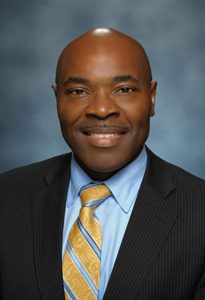 In this latest installment of the Throughline, Max Silverman speaks with Superintendent Joseph Davis about his commitment to changing educators’ mindsets to enable the creation of rich and challenging learning environments featuring strong content for all students — especially students of color.
In this latest installment of the Throughline, Max Silverman speaks with Superintendent Joseph Davis about his commitment to changing educators’ mindsets to enable the creation of rich and challenging learning environments featuring strong content for all students — especially students of color.
Dr. Joseph S. Davis has been the superintendent of the 11,000-student Ferguson-Florissant School District in Hazelwood, Mo. since 2015. A former middle school and high school math teacher, Davis previously served as the superintendent of the Washington County school system in North Carolina and was also the deputy chief of schools for the Chicago Public Schools. He has earned two master’s degrees in education and holds a doctorate in administration, planning and social policy from the Harvard University Graduate School of Education.
Max Silverman: I’d like to start by asking what you love to see in a classroom or learning environment that is inclusive, engaging and will ultimately lead to student ownership of learning.
Joseph Davis: I want to see a couple of things. One is teachers who are super clear about what kids ought to know and be able to do by the end of each school year. Another is teachers who are passionate about preparing the children in front of them for academic success; teachers — all teachers — who actually believe that the children they teach can perform at the highest level. Teachers are the critical levers in classrooms.
Students who feel valued are more curious about their own learning and they engage in the content in a way that will push their thinking and learning. It’s really important that students struggle, but that they struggle productively. Students need to productively struggle with the proper tools they’ve received from their teachers who have thought about the standards, teachers who have thought about what their kids ought to know and be able to do. And also teachers who are presenting data in ways that cause students to be curious enough and ask questions like, “What problem will I solve and how does that look?” These are the kinds of things that say to me when I enter a learning environment that every child is cognitively engaged, learning and being challenged in ways that will cause them to take responsibility for their own learning and success.
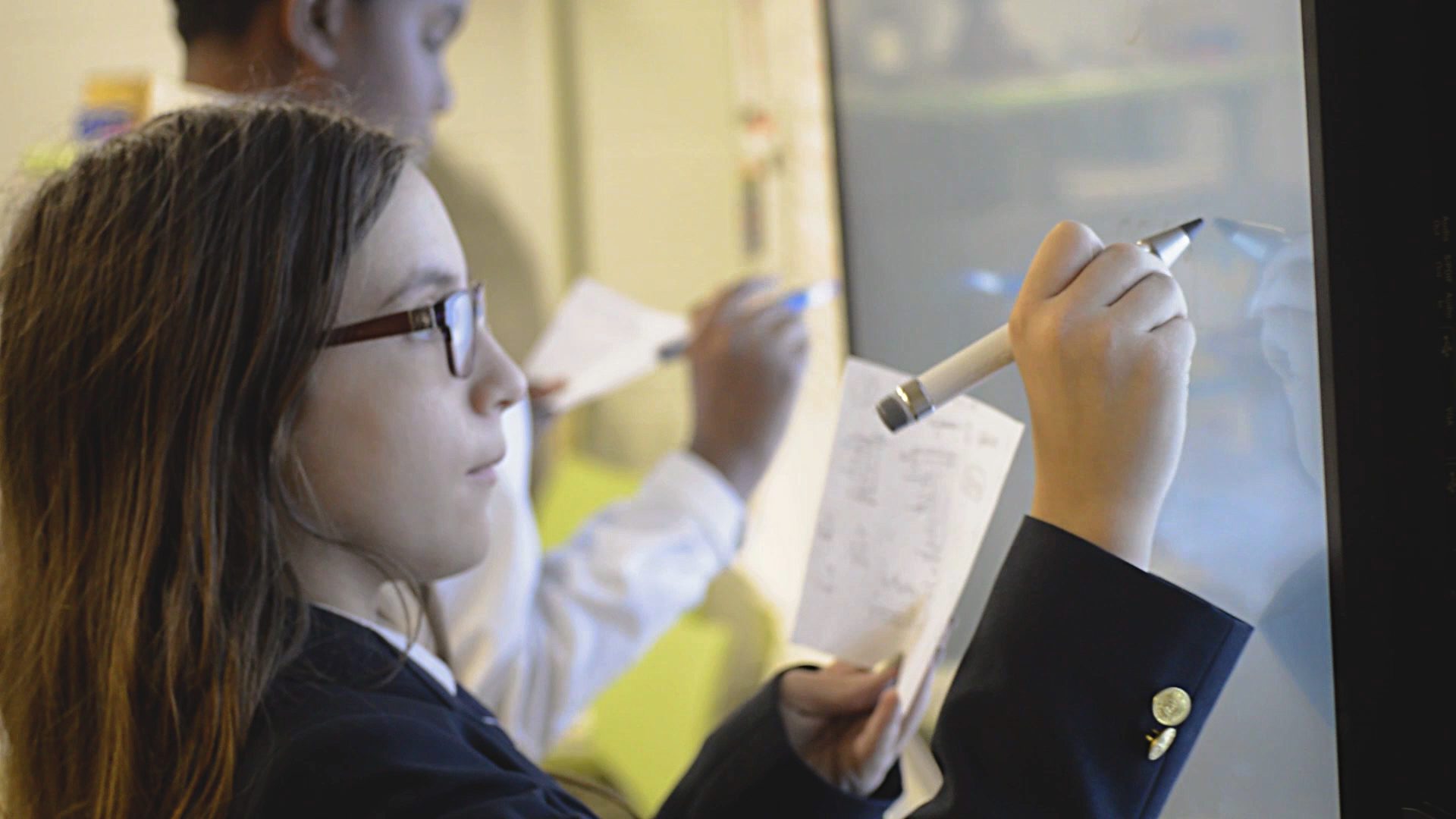
Max Silverman: I love the picture you painted of teachers who are thoughtful about standards and students who are engaged in what you call “productive struggle.” What does that look and sound like in one of your classrooms?
Joseph Davis: Recently, I was in a fifth-grade science classroom. The students were talking about wind turbines. There was one student, who happened to be an African American male who had a prototype of a windmill that he had created, and the challenge was to think about what kind of energy was being created and how it was being created. I saw this young mind — a young black boy — fully engage in the content. He was turning the prototype and thinking about where the energy came from and how it transfers. He was a little confused, but he had the proper tools in front of him that the teacher had scaffolded to enable him to struggle productively.
Simply giving students information and expecting them to get through it is struggle, but scaffolding your work so that kids have adequate tools allows them to productively struggle through a problem. That’s where you also begin to see misconceptions being corrected.
Max Silverman: So, what needs to change in the world of teaching so that your students can engage in these ways you know in your heart they have the ability to do?
Joseph Davis: If we’re going to see the things you just talked about — kids actually getting to a place where they can be productive citizens — to me, the heavy lift is always, “How do we change the mindsets of adults about the students in front of them, especially if they are students of color?”
“Sometimes society has a lower standard for kids of color, especially black kids, and more specifically black males. It’s really important that we think about all kids being able to perform at the highest level.”
Being a first-generation college graduate and being raised by my mom and my grandma — they had to work hard — I knew the value of an education. But I didn’t really get it until I was in school with teachers who made sure I got it. What’s really important is that teachers believe deeply in all kids. Sometimes society has a lower standard for kids of color, especially black kids, and more specifically black males. It’s really important that we think about all kids being able to perform at the highest level.
“What needs to change is the mindset about the kids in front of us every day and then the quality of content that they’re engaging in. Teachers are masterful. They are the secret sauce. But they need support as well.”
What needs to change is the mindset about the kids in front of us every day and then the quality of content that they’re engaging in. Teachers are masterful. They are the secret sauce. But they need support as well. They have to have high-quality, rich content. You can have the best teacher but low-level content and kids would never get there. I’m not worried about the test scores. What I’m worried about is their deep understanding of concepts. We call it rigor and having procedural fluency, but can they apply those concepts? When kids can do that well, it’s because teachers have scaffolded it and they are engaging in rich content. Test scores will come when kids have demonstrated content mastery. The short answer is what needs to change is some teachers’ mindsets and making sure that the quality of the teacher and rich content is in the same space with the student, interacting for successful student outcomes.
Max Silverman: For teachers in your system — and leaders — who have successfully changed their mindsets, are there certain pedagogical skills they need to help students engage with this rich content?
Joseph Davis: I believe so. The ability to make those mid-course corrections when needed and deepening teacher content knowledge is really important
I often use elementary mathematics as an example, since I was a math teacher. Preparing students for science, technology, engineering and math careers — mathematics is the foundation. But we’re finding that elementary mathematics has a gap. And that gap is getting even wider where teachers don’t have that content knowledge early on. The art of teaching is better when that content knowledge is stronger. Most elementary teachers feel really good about teaching reading, but don’t feel as good about teaching math. I feel strongly that the same teacher moves used to teach kids literacy well have to be applied to teaching numeracy well. But to do that, teachers need deeper content knowledge in mathematics at the elementary grades. That’s where we’re sort of hanging our hat, supporting teachers more in elementary mathematics along with continuing our other work.
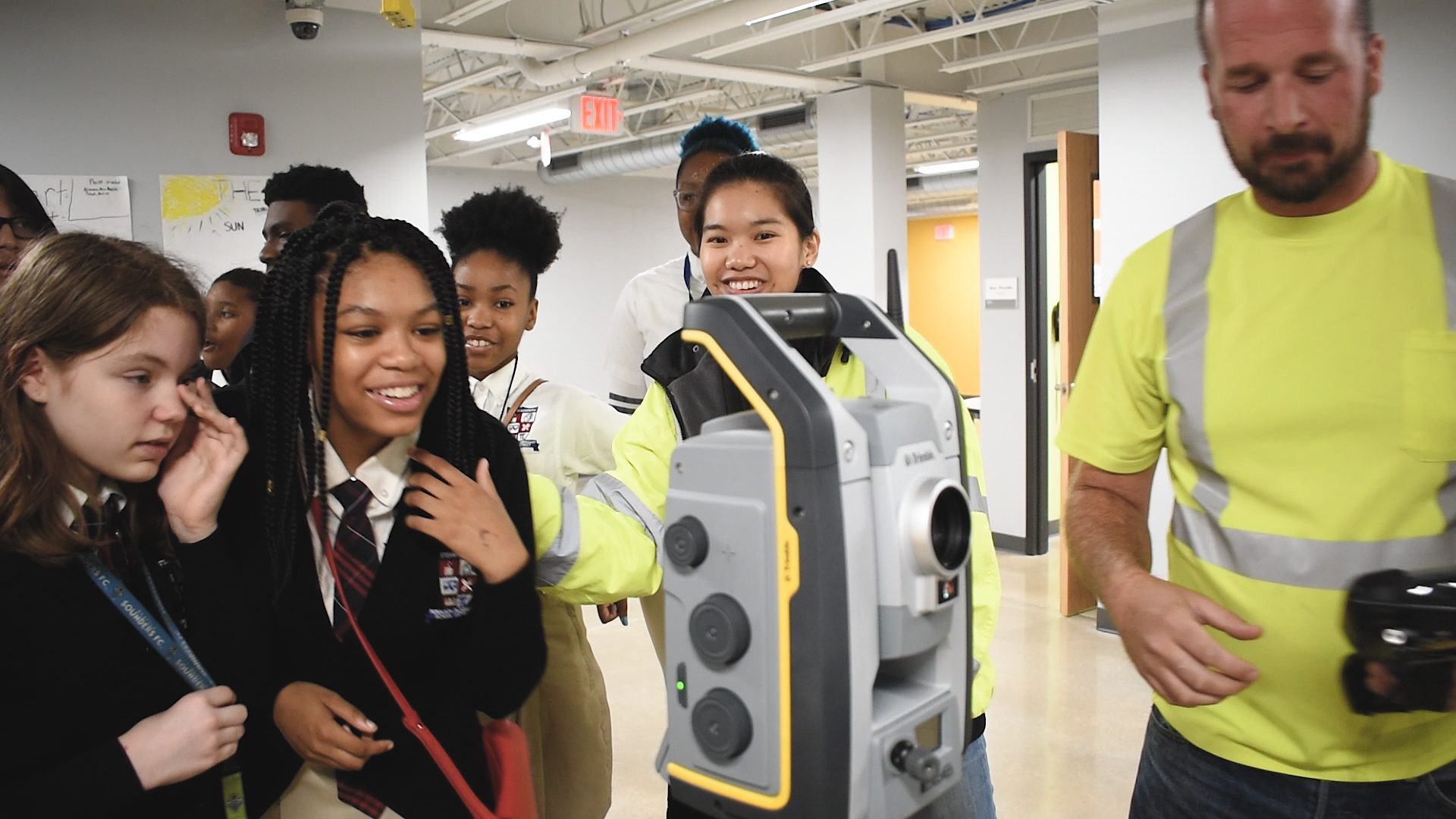
Max Silverman: There’s definitely a tricky intersection between general pedagogical skills — like how to engage students — and skills that engage them so they acquire numeracy and other skill sets.
“Principals have to create the kind of environments for teachers to feel that’s okay, that it’s safe to not always know, and then to get support.”
Joseph Davis: It’s hard for adults to say they don’t know even though it’s okay not to know. What we’ve done is try to be really vulnerable in our quest to be better as learners. One of the things I try to push really strongly in our community is that we all have to be learners — especially adult learners. Principals have to create the kind of environments for teachers to feel that’s okay, that it’s safe to not always know, and then to get support. It was tricky at the beginning. It is more fluid now because we have principals who get it, who know how to lead learning, who know how to better support teachers.
Max Silverman: That leads right into my next question. What does it look like when a school leader is supporting the learning and growth of teachers? What are they actually doing to create rich adult learning environments that hopefully mirror the rich learning environments you want for your students?
Joseph Davis: Principals are critical levers in schools, especially in struggling schools. If we’re going to really move learning to deeper levels for students, principals have to learn how to be good coaches. They have to know how to facilitate, be directive, calling on whatever coaching moves necessary to improve teacher practice. The best gains we’re going to get in our schools from principals and leaders is when principals can coach teams, or PLCs (professional learning communities) — those places where teachers are working together, learning and thinking about students and how to use data to improve student outcomes.
Max Silverman: We call this blog The Throughline to emphasize that the line of problem-solving, collaboration and getting better goes from students, all the way up to you as superintendent. If that line gets broken it decreases the likelihood students will have the experience you want. In the ideal world, what should the role of the school system central office be in supporting that line?
Joseph Davis: It starts with me [as superintendent] being in classrooms and working with principals. We structure our work in this organization to clearly define how each central office role impacts the classroom.
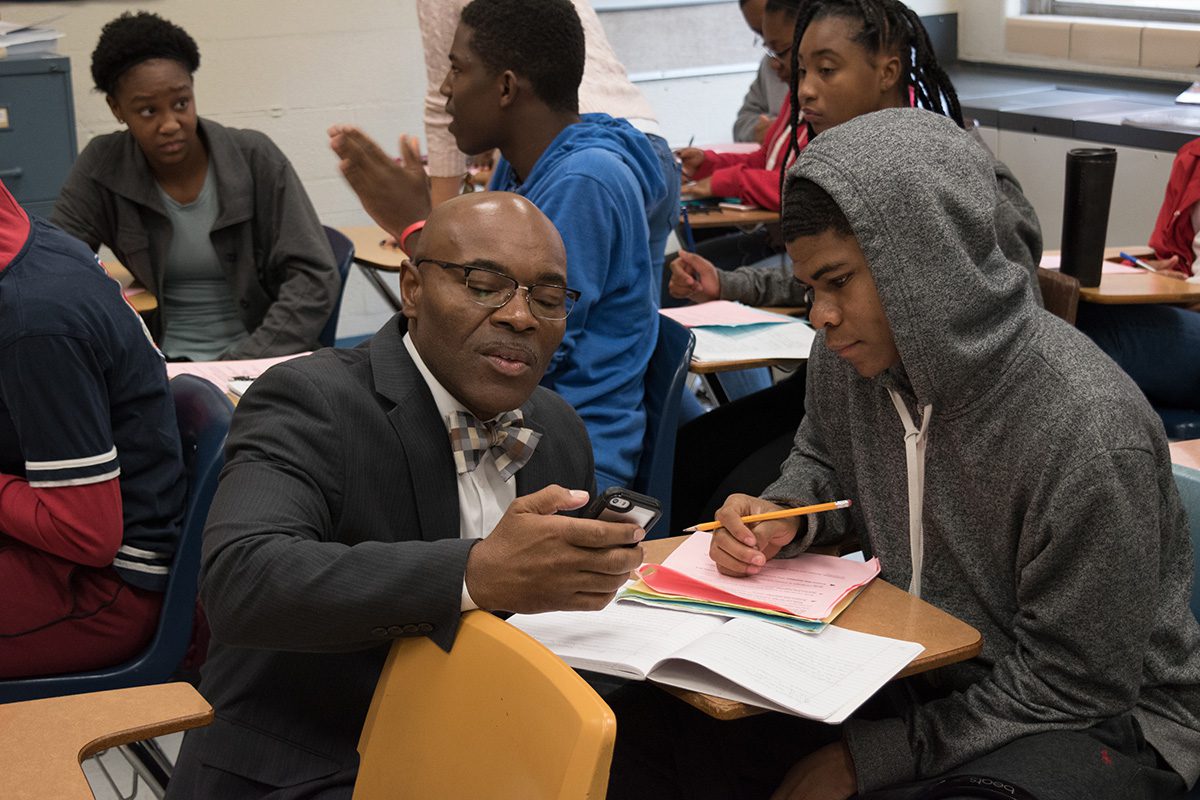
For me, my work is much more impactful when I am in classes. This time allows me to get a clear sense of student and teacher needs. Principal supervisors, who are assistant superintendents, supervise principals. I try to make the connection or throughline from my role, the role of principal supervisors, then principals and on to teachers and ultimately students, so that when principals are having conversations with their supervisors, they better understand the conversations I have with their supervisor so the throughline is strengthened. We try to keep it linear when possible. When there is support needed with the principal supervisors, or with principals, I can step in or step back when I need to.
Being in the classroom as a superintendent helps me to keep my hands on the pulse of student learning. I take full responsibility for the education of children in our community. My son is one of our students. He’s an eighth-grader and he started here when he was in fifth grade. And he’s progressing well. So my wife and I are like every other parent in this community. We want a high-quality education for our child. It’s my duty as superintendent, but also as a taxpayer, and more importantly as a father, to make sure we’re making it very clear that everybody, particularly the central office, is here to support students and teachers for excellent student outcomes.
Max Silverman: Knowing a bit about your political context, I know there are other roads you could have taken as a superintendent that would probably be easier — such as only pursuing raised test scores — but you’ve chosen a path that is more meaningful for your students, your families and your community. How do you find the fortitude and courage to lead in the ways you’re choosing to lead?
Joseph Davis: I can’t put aside how I was raised. I grew up poor and didn’t know it. My grandmother and my mother shielded me from some of the things we experienced. I had some great teachers and I saw the power of a quality education — not just a diploma — and what it did for me as a first-generation college student.
“The more educated our children are, the better our communities become. Education is the best form of economic development.”
I’m able to take care of my family well and I have choices. A lot of those choices have come because of a quality education. When you’re educated well, it’s liberating. And every person deserves that. I look at my role as superintendent and see myself more as a lead teacher. They call me superintendent, but I love teaching. Every opportunity I get, I’m trying to teach.
The more educated our children are, the better our communities become. Education is the best form of economic development. It’s my duty to make sure that other people can get it too. I don’t care what color they are. It just so happens that in this community, most of the kids are black, that they look like me and they come from homes like mine.
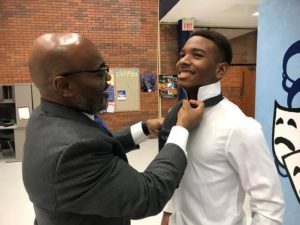 But the white kids deserve a quality education too, the Hispanic kids do, the biracial kids do, everybody does. I’d be a hypocrite if I did anything different. Our kids only get one chance. I only got one chance. So I guess it’s a moral responsibility. I also have a duty to my faith and to what I believe. That’s not popular and I get criticized quite a bit, but I believe strongly in what we do — so much so that if I could start over, I’d do it twice as hard.
But the white kids deserve a quality education too, the Hispanic kids do, the biracial kids do, everybody does. I’d be a hypocrite if I did anything different. Our kids only get one chance. I only got one chance. So I guess it’s a moral responsibility. I also have a duty to my faith and to what I believe. That’s not popular and I get criticized quite a bit, but I believe strongly in what we do — so much so that if I could start over, I’d do it twice as hard.
Max Silverman: Dr. Davis, I have been so inspired listening to you, and I know our readers will be as well. Thank you.
Joseph Davis: It has been my pleasure.
Photos used with permission from Ferguson-Florissant School District. All rights reserved.

